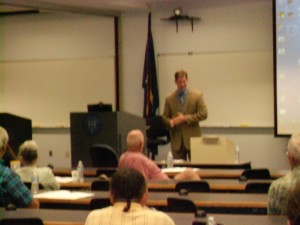by Sarah Schauerte
The Department of Veterans Affairs (“VA”) is amending its regulations in a way that may impact veterans with service-connected traumatic brain injury (“TBI”). Under its proposed amendments, five diagnosable illnesses will be considered secondary to service-connected TBI (the “Secondary Disabilities”). If a veteran has a rating for TBI, and also suffers from a Secondary Disability, he or she will be presumed to be entitled to disability compensation for the Secondary Disability.
The five Secondary Disabilities are:
- Parkinson following moderate or severe TBI;
- Unprovoked seizures following moderate or severe TBI;
- Dementias (presenile dementia of the Alzheimer type and post-traumatic dementia) if manifested within 15 years following moderate or severe TBI;
- Depression if manifested within three years of moderate or severe TBI, or within 12 months of mild TBI; and
- Disease of hormonal deficiency that result from hypothalamo-pituitary changes if manifested within 12 months of moderate or severe TBI.
Under these amended regulations (codified at 38 CFR 3.310), a veteran will be presumed to have these disabilities as secondary to service-connected TBI unless there is “clear and convincing” evidence to the contrary. Evidence of “clear and convincing” evidence to the contrary includes: 1) evidence that the Secondary Disability predated the TBI (and was therefore not caused by the TBI); 2) medical evidence that another disability (other than TBI) caused the Secondary Disability; or 3) medical evidence showing that the Secondary Disability is unrelated to the TBI.
TBI is rated under VA Diagnostic Code 8045, which explains the ten different facets of TBI impairment. These include, among others: memory, attention, concentration, executive functions; judgment; social interaction; orientation; and subjective symptoms. The VA rates a veteran who claims disability caused by TBI under each facet, and the highest rating assigned to any facet controls. Under the wording of the amended regulation, in order to be entitled to the presumption as it relates to the Secondary Disabilities, a veteran must be rated as a “two” under at least one TBI facet (or 40%), which entitles him or her to a “moderate” rating for TBI.
This development follows a report issued by the National Academy of Sciences, Institute of Medicine (“IOM”), Gulf War and Health, Volume 7: Long-Term Consequences of Traumatic Brain Injury (the “NAS Report”). This report analyzes the association between TBI and the Secondary Disabilities, finding that there is “sufficient evidence of an association” between moderate or severe levels of TBI and the Secondary Disabilities. Based on the evidence presented by the NAS Report, the Secretary of the VA determined that a revision to its regulations is warranted.
This amendment is the first regulation change affecting TBI disability compensation claims in four years. In October 2008, the VA revised the rating criteria for TBI, which was considered by both the VA and veterans advocates alike as inadequate to compensate for the disabilities caused by TBI. Under the previous rating criteria, most veterans who suffered from TBI were awarded only a 10% evaluation for disabilities that may have been moderately severe, very severe, or totally disabling. Complaints that the previous schedule was inadequate to adequately compensate veterans for the many and complex residuals of TBI brought about VA’s revision of the TBI rating criteria.
Similarly, this new amendment reflects efforts to adequately compensate veterans who suffer from other disabilities caused by TBI. The presumption contained within the rule will eliminate hoops veterans must generally jump through to receive compensation – rather than having to prove service-connection, a diagnosis of the disability will suffice.
Comments must be received on or before February 8, 2013 to be considered by the VA. For a complete copy of the rule and instructions for providing comments, please visit: http://www.gpo.gov/fdsys/pkg/FR-2012-12-10/pdf/2012-29709.pdf.
Did you find this article informative? If so, sign up for my weekly blog on veterans issues and updates at: https://legalmeetspractical.com. Make sure to click the link sent to your email to activate your subscription!

